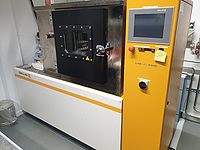Specific Process Knowledge/Back-end processing/Hot Embosser: Difference between revisions
No edit summary |
|||
| (7 intermediate revisions by 3 users not shown) | |||
| Line 1: | Line 1: | ||
'''Feedback to this page''': '''[mailto:labadviser@nanolab.dtu.dk?Subject=Feed%20back%20from%20page%20http://labadviser.nanolab.dtu.dk/index.php?title=Specific_Process_Knowledge/Back-end_processing/Hot_Embosser click here]''' | '''Feedback to this page''': '''[mailto:labadviser@nanolab.dtu.dk?Subject=Feed%20back%20from%20page%20http://labadviser.nanolab.dtu.dk/index.php?title=Specific_Process_Knowledge/Back-end_processing/Hot_Embosser click here]''' | ||
<!-- Replace "http://labadviser.danchip.dtu.dk/..." wih the link to the Labadviser page--> | <!-- Replace "http://labadviser.danchip.dtu.dk/..." wih the link to the Labadviser page--> | ||
'''Unless anything else is stated, everything on this page, text and pictures are made by DTU Nanolab.''' | |||
== Hot Embosser == | == Hot Embosser == | ||
| Line 8: | Line 8: | ||
The Hot Embosser at DTU Nanolab is a hydraulic machine, a Collin Press P300 SV. It is located in the basement of building 346 (room 901). The device is typically made using variety of different polymer foils, as well as Graphene. A master pattern, called a shim, is usually fabricated in Si, but can also be fabricated in metals as well as other polymers. It is placed inside the machine between the pressure hot plates, and using a combination of heat and pressure patterned on to the foil. It is possible to replicate both small and large 2½D structures relatively fast. | The Hot Embosser at DTU Nanolab is a hydraulic machine, a Collin Press P300 SV. It is located in the basement of building 346 (room 901). The device is typically made using variety of different polymer foils, as well as Graphene. A master pattern, called a shim, is usually fabricated in Si, but can also be fabricated in metals as well as other polymers. It is placed inside the machine between the pressure hot plates, and using a combination of heat and pressure patterned on to the foil. It is possible to replicate both small and large 2½D structures relatively fast. | ||
[[image: | [[image:hotembosser.jpg|200x200px|right|thumb|Location of the machine is the basement of building 346 room 901, photo: DTU Nanolab]] | ||
'''The user manual(s), quality control procedure(s) and results, user APV(s), technical information and contact information can be found in LabManager:''' | '''The user manual(s), quality control procedure(s) and results, user APV(s), technical information and contact information can be found in LabManager:''' | ||
| Line 37: | Line 37: | ||
|style="background:WhiteSmoke; color:black"| | |style="background:WhiteSmoke; color:black"| | ||
*Temperatures close to the glass transition temperature of the polymer give the best results when it comes to pattern replication. | *Temperatures close to the glass transition temperature of the polymer give the best results when it comes to pattern replication. | ||
*Temperatures that are 5 degrees above the glass transition | *Temperatures that are 5 degrees above the glass transition temperature of the polymer give the best results when bonding lids on top of chips. If bonding chip to lid, where the polymers are of different types/grades this rule will not apply | ||
|- | |- | ||
Latest revision as of 16:01, 27 March 2023
Feedback to this page: click here
Unless anything else is stated, everything on this page, text and pictures are made by DTU Nanolab.
Hot Embosser
The Hot Embosser at DTU Nanolab is a hydraulic machine, a Collin Press P300 SV. It is located in the basement of building 346 (room 901). The device is typically made using variety of different polymer foils, as well as Graphene. A master pattern, called a shim, is usually fabricated in Si, but can also be fabricated in metals as well as other polymers. It is placed inside the machine between the pressure hot plates, and using a combination of heat and pressure patterned on to the foil. It is possible to replicate both small and large 2½D structures relatively fast.
The user manual(s), quality control procedure(s) and results, user APV(s), technical information and contact information can be found in LabManager:
Process information
At the moment there are no set processes for the machine. Each material demands different process parameters, depending on the type of process you are running. For development of process that fits your needs contact for the machine responsible personel, and we will assist you in designing the optimal process
| Equipment | Equipment 1 | |
|---|---|---|
| Purpose |
| |
| Performance | Press Plates Temperature |
|
| Press Plates Pressure |
| |
| Process parameter range | Temperature |
|
| Pressure |
| |
| Substrates | Batch size |
|
| Allowed materials |
| |
